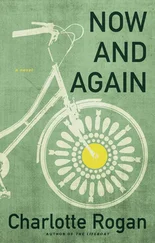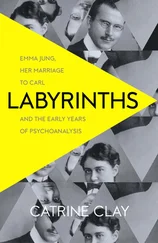“Well, I work for Uncle Sam. I have a wife, Beth, and a son who will be eleven in October.”
“And how are they coping with what you’re going through?” Dr. Bernard asks. David pauses, wiping the back of his hand across his mouth, and then shakes his head.
“They’re fine. Beth is, well, she’s used to handling chaos. She’s excellent at it. And she knew I wasn’t going to die. She knew, one way or another, that I wouldn’t let something like that take me down.”
“And your son?”
David is silent for longer this time. “He’s fine. He’s a strong little kid. Takes after his old man that way. Right now he’s in Wisconsin with his grandparents. Beth, she thinks it’s better to keep him away from the hospital, you know?”
“And what do you think?” Dr. Bernard asks.
“I think a kid has to grow up sometime. I was never protected from anything as a child, and I don’t think my son should be either,” he says, all hard authoritarian bluster, but then something shifts in him. I can almost see the set of his shoulders soften. “Anyway, I’m his father. He shouldn’t need to be protected from me.”
I want to tell him that he’s wrong, that we are capable of such great damage, that it’s only by the grace of God or modern medicine that we haven’t ruined the lives of the people who love us. But he looks so angry, and so vulnerable in his anger, that I’m sure he already knows. It’s a startling feeling, to look at David Jenkins and see something familiar.
“That enough?” he asks. “Did I sing enough to earn my supper this week?”
“I appreciate your willingness to share with us,” Dr. Bernard replies, and I’m still too distracted by David to realize that I’m on deck. “How about you, Hannah?” Dr. Bernard says. I straighten in my chair, fumbling with all of the things that I no longer know about myself.
“I’m a graduate student at the Art Institute. A painter. I live with my boyfriend, Sam.” I falter, thinking of Lucy’s visit. “Well, I guess he’s my fiancé, now. Since I didn’t die.”
“Congratulations,” Dr. Bernard says. “What was it that brought you here?”
“Lung cancer,” I reply, trying to keep my face impassive, even as the words still feel so dense with agony that their shape is strange in my mouth. “Not the kind you get from smoking cigarettes. The kind you get from a really bad roll of the genetic dice.”
“What was that like? To be diagnosed and be chosen for the program so suddenly?”
“One minute I was dying, and then I wasn’t,” I reply, as if it is a trifle. In truth, I’ve been thinking a lot about the beginning, as if pinpointing the genesis of my illness will hold the key to how everything went so wrong so quickly. It was spring, and it was windy. I was heading home from a class at the Art Institute as dust and dead leaves skidded along Michigan Avenue in a series of wild gusts. Hurrying, I think. Late for dinner with Sam. My large canvas portfolio was catching the wind and propelling me at odd angles as I struggled down Harrison, heading for our apartment. I ran across the street during a gap in the rush-hour traffic, the pressing itch accumulating in my chest, gaining in heaviness as I fished my keys out of my pocket. I coughed hard, breathless, doubling over. Trying to force the feeling out of my lungs. Trying to clear them of whatever had taken root there. It was the first time I wondered if it was not a lingering cold that was keeping me up at night, soaking me with sweat. It was the first time my body became a source of fear.
“I’m fine.” I smile at him, the fake smile, my first new trick in this new body. Thinking of riding the L home after the diagnosis, the SUBlife brochure in my hands, trying to read the pages through the glassy swell of my tears. And later, crouched on my bathroom floor, making the profound mistake of hyperventilating while having lung cancer, when Sam came home and found me. “I’m dealing with it fine,” I repeat, so Dr. Bernard will move on to someone else.
Dr. Bernard nods. “All right. And you?” He motions to Connie.
The bombshell fixes him with a slightly weary look. “What’s there to say, doc? I was an actress with a hell of a promising career when I shot up with the wrong people. Spent the last five years living off my Social Security checks in a rat hole of an apartment in Uptown.”
“You contracted an aggressive strain of HIV,” Dr. Bernard says.
“Lucky, right? Though,” she motions to the rest of us, “I guess I’m in good company when it comes to the luck department, aren’t I? We’re all either very lucky or very unlucky, hell if I know which.”
“And how does it feel, now that you have a second chance at the career you thought you lost?”
Connie sits back in her chair, her legs stretched out in front of her, crossed at the ankle, her feet almost reaching Dr. Bernard’s.
“Peachy,” she replies.
Dr. Bernard adjusts his tie, pulling it away from the skin of his neck. “Linda. Could you tell us a little about your situation before the transfer?”
Linda is still wide-eyed and twitchy, but some of last week’s terror seems to have left her. She swallows.
“I was in a car accident. Eight years ago.”
“And what happened as a result of that accident?” Dr. Bernard prods.
“I couldn’t move. I could blink, but that was all.” She blinks now, as if to demonstrate.
“I read about a guy who had that same thing,” David says, nodding, his face a phony attempt at gravity. “He wrote a book by blinking the letters of the alphabet. Or something like that.”
“I guess I didn’t make good use of my time then,” Linda replies, looking at her feet. I can’t tell if she’s trying to be funny.
“Linda, last week you asked us a question that we couldn’t answer, about your family, about whether they still love you. What made you ask that?” Dr. Bernard leans forward in his seat, his hands steepled in front of his mouth, his eyes intent on her.
“I don’t know,” Linda replies, simply, her voice devoid of emotion. “I guess I wouldn’t love someone who left me like that.”
Her words hit me in the stomach. Not because her situation is awful, though it is, terribly. But because in that moment I think of Sam. Like a reflex. I think of waking alone in that hospital room, of Lucy’s explanations. As if part of me knows a secret that the rest of me is trying, desperately, to unlearn.
I follow Hannah up to the roof after the support group disbands. It’s curiosity more than anything. She sat there like a stone for the last twenty minutes of the session, unmoving, her eyes fixed in middle space. It was something in Linda’s story, I think, that sunk her so far into her head that she only resurfaced when Dr. Bernard repeated her name, twice, before we finished.
Hannah has fascinated me ever since our little tête-à-tête near the coffee cart. Some part of me must have feared that I’d been lost in the transfer, too changed to return to my old life, until this girl turned all of her wrath in my direction. It’s amazing, how familiar it is to be hated, almost like coming home.
I follow her up five flights of stairs, pausing at each landing to regain the strength in my lungs and my legs, listening as she does the same a flight or two above me. She must hear me panting below her, but she doesn’t wait, and I wonder if the mood she’s in has divorced her from any hint of the world outside her own mind. She reaches a door marked “Authorized Personnel Only” and walks through with such unflinching confidence I wonder if she’s ever gotten in trouble for breaking a rule in her life.
Following her out onto the roof feels like summiting a mountain, all fresh air and endorphin-filled exhaustion. I’m sweaty and drained, and when I find her collapsed against a brick wall with her legs stretched in front of her, I drop like dead weight next to her. Street noise — the honking of horns, the squeaky breaks of city buses, and the rumble and jostle of traffic — wafts up around us, like music being played in a faraway room. It’s sunny, but gusts of late-summer wind drive heavy, fast-moving clouds above us. Their shadows crawl their way across the concrete of the roof.
Читать дальше












